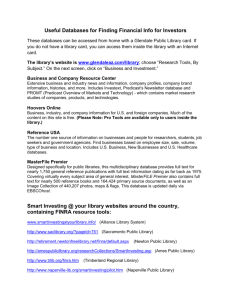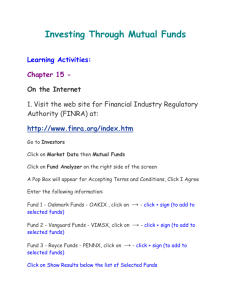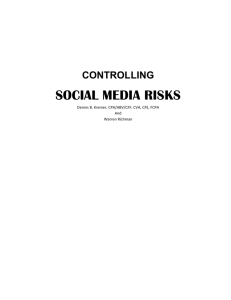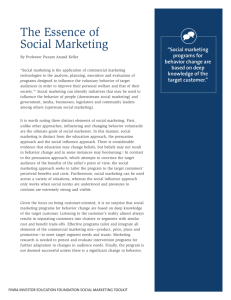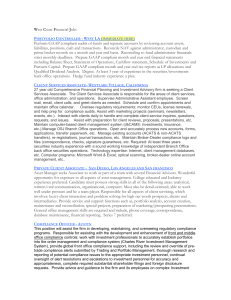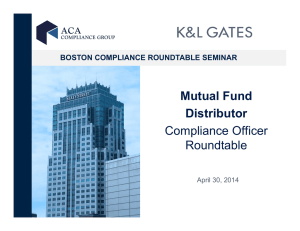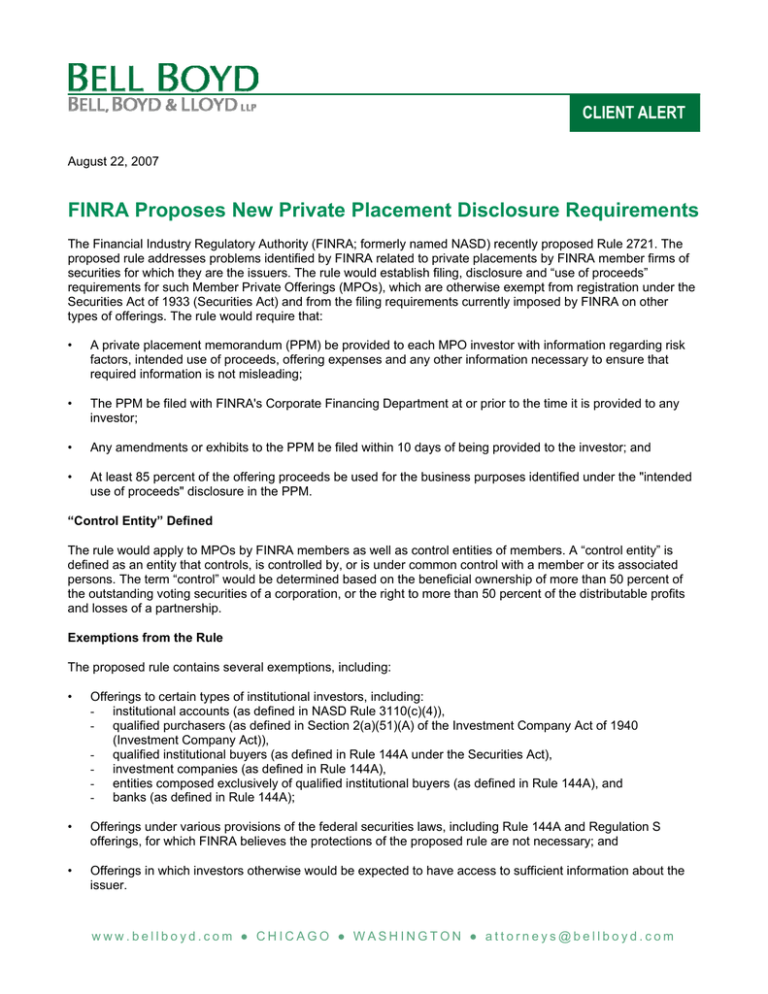
August 22, 2007
FINRA Proposes New Private Placement Disclosure Requirements
The Financial Industry Regulatory Authority (FINRA; formerly named NASD) recently proposed Rule 2721. The
proposed rule addresses problems identified by FINRA related to private placements by FINRA member firms of
securities for which they are the issuers. The rule would establish filing, disclosure and “use of proceeds”
requirements for such Member Private Offerings (MPOs), which are otherwise exempt from registration under the
Securities Act of 1933 (Securities Act) and from the filing requirements currently imposed by FINRA on other
types of offerings. The rule would require that:
•
A private placement memorandum (PPM) be provided to each MPO investor with information regarding risk
factors, intended use of proceeds, offering expenses and any other information necessary to ensure that
required information is not misleading;
•
The PPM be filed with FINRA's Corporate Financing Department at or prior to the time it is provided to any
investor;
•
Any amendments or exhibits to the PPM be filed within 10 days of being provided to the investor; and
•
At least 85 percent of the offering proceeds be used for the business purposes identified under the "intended
use of proceeds" disclosure in the PPM.
“Control Entity” Defined
The rule would apply to MPOs by FINRA members as well as control entities of members. A “control entity” is
defined as an entity that controls, is controlled by, or is under common control with a member or its associated
persons. The term “control” would be determined based on the beneficial ownership of more than 50 percent of
the outstanding voting securities of a corporation, or the right to more than 50 percent of the distributable profits
and losses of a partnership.
Exemptions from the Rule
The proposed rule contains several exemptions, including:
•
Offerings to certain types of institutional investors, including:
- institutional accounts (as defined in NASD Rule 3110(c)(4)),
- qualified purchasers (as defined in Section 2(a)(51)(A) of the Investment Company Act of 1940
(Investment Company Act)),
- qualified institutional buyers (as defined in Rule 144A under the Securities Act),
- investment companies (as defined in Rule 144A),
- entities composed exclusively of qualified institutional buyers (as defined in Rule 144A), and
- banks (as defined in Rule 144A);
•
Offerings under various provisions of the federal securities laws, including Rule 144A and Regulation S
offerings, for which FINRA believes the protections of the proposed rule are not necessary; and
•
Offerings in which investors otherwise would be expected to have access to sufficient information about the
issuer.
www.bellboyd.com ● CHICAGO ● WASHINGTON ● attorneys@bellboyd.com
Notably, however, MPOs made to “accredited investors,” as defined in Rule 501 of Regulation D under the
Securities Act, that do not otherwise fall within any of the above categories would not be exempt from Rule 2721.
Industry Response
Several organizations and industry groups have submitted comment letters to FINRA regarding Rule 2721. The
Managed Funds Association (MFA) in its letter requested that FINRA exempt from the rule: (i) privately offered
commodity pools, which, it notes, are well regulated by the National Futures Association and the Commodity
Futures Trading Commission; and (ii) investment funds, such as hedge funds, that are exempt from registration
under Section 3(c)(1) of the Investment Company Act. MFA argued that the “sophisticated investors” to whom
those funds are offered “do not need the protection of the SEC, nor FINRA.” In addition, MFA expressed concern
that the definition of a “control entity” is overly broad, pointing out that if a FINRA member firm provided a newly
formed fund with seed capital, it could exceed the 50 percent threshold and trigger the PPM filing requirement
even though that firm would likely cease to be a “control entity” after the fund’s first closing.
The Committee of Federal Regulation of Securities of the American Bar Association’s Section of Business Law
(ABA Committee) echoed many of the concerns expressed by MFA, stating that the rule “might impose a
compliance burden on FINRA members that far exceeds the regulatory benefits” and would “establish an
additional scheme of regulation for private placements that will operate separately from that of the SEC.”
A general concern raised by proposed Rule 2721 is that, although a PPM may be filed concurrently with an MPO,
FINRA has stated that it will not issue a “no-objections” opinion with respect to a filing and that, if it determines
upon review of a PPM that the disclosures “appeared to be incomplete, inaccurate or misleading,” FINRA could
“make further inquiries.” The ABA Committee and other commentators noted that this would significantly expand
the traditional role of FINRA by giving it authority effectively to conduct “merit reviews” of MPOs.
Status of the Rule Proposal
With the comment period for proposed Rule 2721 having expired, the rule must now be authorized for filing with
the SEC by the FINRA board, and then must be approved by the SEC, following publication for public comment in
the Federal Register. FINRA has not offered a specific timeline for the implementation of the rule.
For further information, please contact Cameron Avery 312-807-4302, Kevin Bettsteller 312-807-4442,
Paul Dykstra 312-781-6029, Jennifer Esquibel 312-807-4262, Alan Goldberg 312-807-4227, Anna Paglia 312-781-7163,
Alicia Perla 312-807-4318, Andrew Pfau 312-807-4386, Paulita Pike 312-781-6027, Eric Purple 202-955-7081,
Bruce Rosenblum 202-955-7087, Donald Weiss 312-807-4303 or Stacy Winick 202-955-7040 of Bell, Boyd & Lloyd’s
Investment Management and Financial Markets Group or visit our Web site at www.bellboyd.com.
This publication has been prepared by the Investment Management and Financial Markets Group of Bell, Boyd & Lloyd for
clients and friends of the firm and is for information only. It is not a substitute for legal advice or individual analysis of a
particular legal matter. Readers should not act without seeking professional legal counsel. Transmission and receipt of this
publication does not create an attorney-client relationship.
© 2007 Bell, Boyd & Lloyd LLP All Rights Reserved
www.bellboyd.com
Bell, Boyd & Lloyd LLP
70 West Madison Street
Chicago, Illinois 60602
t. 312-372-1121
f. 312-827-8000
Bell, Boyd & Lloyd LLP
1615 L Street, N.W.
Washington, D.C. 20036
t. 202-466-6300
f. 202-463-0678

